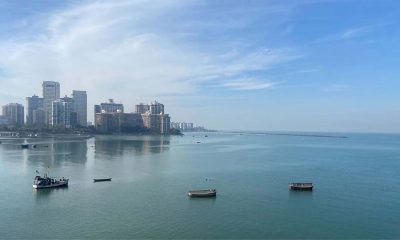Maharashtra
G-20 delegates soak in Pune’s rich heritage, visit Aga Khan Palace
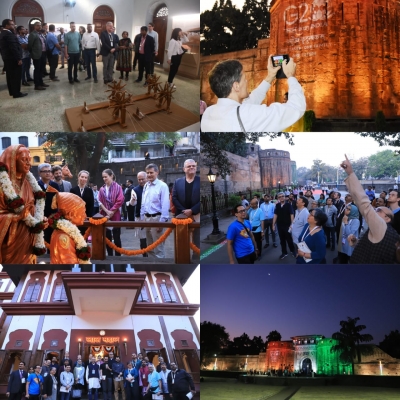
Visiting G-20 delegates went around some of the historical and heritage sites of Pune including the Aga Khan Palace, learning about the history and importance of various locations, officials said here on Wednesday.
The G20 team went around the famed Aga Khan Palace where Mahatma Gandhi was incarcerated for nearly two years during the Quit India Movement (1942) along with his Kasturba Gandhi, and his secretary Mahadev Desai, besides Sarojini Naidu.
The delegates were provided information about Gandhiji and Kasturba’s childhood and their life, their pivotal role in the freedom struggle, etc, how Mahadev Desai passed away a few days after he was jailed here (August 15, 1942), and then the passing of Kasturba (February 22, 1944), and their ‘samadhis’ are there.
They went around the museum there, viewed the exhibits displayed there, learnt about Gandhiji’s legacy, the ‘Charkha’ and the ‘samadhis’ in the palace complex.
At the historical Lal Mahal, built by Shahaji Raje Bhosale in 1630, the delegates learnt about the history and life of his son and later the great Maratha warrior-king, Chhatrapati Shivaji Maharaj, and viewed the statues of ‘Bal Shivaji’ who lived here for many years during his childhood along with his mother Rajmata Jijamata Bhosale, and saluted them.
The visitors were thrilled by the grandeur of the Shaniwar Wada built in 1732, an erstwhile fort complex with 5 imposing ‘darwazas'(gates) within which over a thousand people lived, but most of the fort was destroyed in fires and other calamities, though the remnants are still awe-inspiring.
The G20 delegation went around the Nana Wada, believed to be built around 1780 as the residence of the legendary Nana Phadnavis, the chief administrator of the Peshwas and labelled by the British as ‘the Maratha Machiavelli’ and learnt about his contributions to the state history.
The G20 delegates were accompanied at various locations by the Municipal Commissioner Vikram Kumar, top officials like Vikas Dhakne, Santosh Deshmukh, Supriya Karmarkar, Neelam Mahajan, Ajit Apte, Sandeep Godbole, Chandrakant Dalvi, and others.
An official coordinating the trip told IANS that the excited delegates learnt a lot about all these historical or heritage sites, asked many questions, clicked photos and selfies at different venues and returned feeling enriched by the outing.
Maharashtra
BMC Elections 2026: 2,516 Nominations Filed For 227 Seats Ahead Of Mumbai Civic Polls
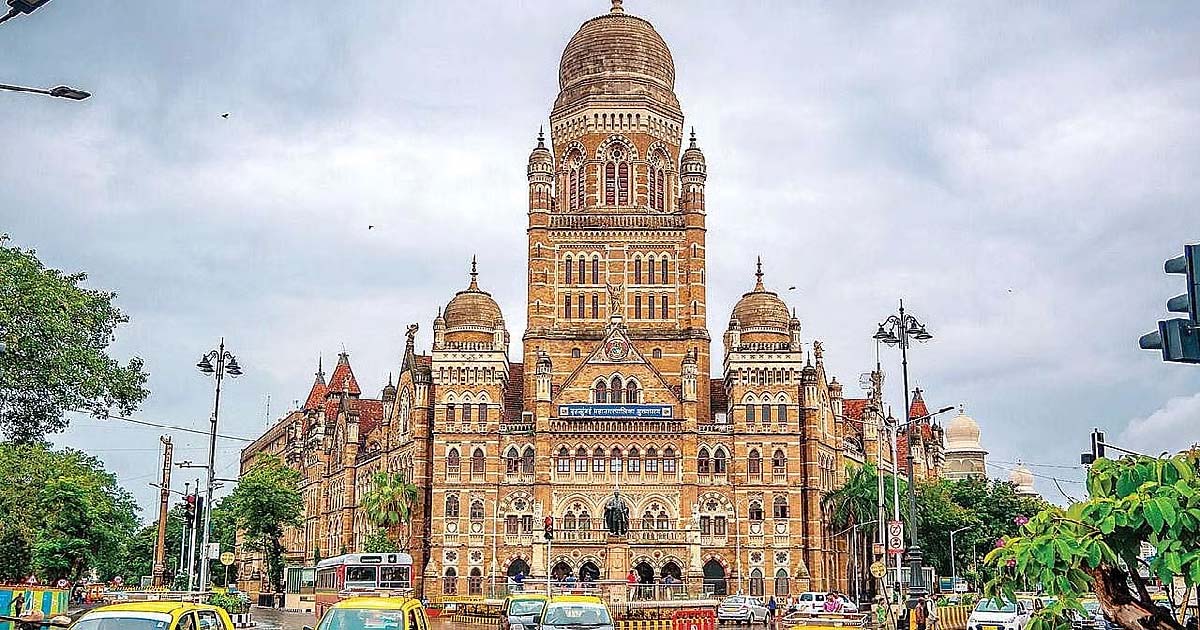
Mumbai: A total of 2,516 nominations has been submitted for the 2026 BMC elections by the all the aspirants, including all political parties and independent candidates. There are 227 seats in the BMC. Out of the total, 2,122 were submitted on Wednesday, December 30, the last day of submitting the nominations papers and affidavits.
The election department has appointed 23 Returning Officers (RO) across Mumbai’s 26 administrative wards. As per the data the state election commission, total 11,392 forms were distributed by the ROs, of which 2,516 were submitted.
See the below chart for number of nominations at each RO office with wards list.
The the ROs office which got highest number of candidates nomination for the BMC elections include: M East ward RO with 182 nominations, M East+M West wards with 164 nominations, A+B+C wards with 150 nominations, G North with 137, K West with 133, H East and S ward with 125 each and N ward with 123.
The lowest number of candidate nomination has been submitted for R Central with 51, C+D wards with 58 and R North ward with 60 nominations.
Today (Thursday, December 31) the BMC election department will scrutinize the nomination submissions and the list will be declared as soon as the process is complete. If any forms are found with improper documentations, affidavits, they will be rejected on technical grounds.
The last day of nomination withdrawal is January 2, and the final candidates list with symbol will be declared on January 3.
All the political parties which saw defections, discontent among its workers for denial of ticket or loss of seat under seat sharing formulas, have time till January 2 to tackle the rebellion in their ranks.
Party wise nominations and seat sharing
In the sharing formula, the BJP will contest on 137 seats and Shiv Sena (Shinde) on 90.
The Congress released a list of a total of 143 candidates, and VBA 62. The Congress-VBA alliance will give the remaining seats to smaller alliance parties like the Rashtriya Samaj Party.
The Shiv Sena (UBT) and MNS alliance has announced a list of 135 and 53 candidates, respectively, till the last reports.
The NCP (Ajit Pawar) announced its third and final list of 30 candidates on Tuesday, taking the total fielded in Mumbai to 94. Notably, 52 women candidates (referred to by the party as ‘Ladki Bahin;) will contest the elections, as the NCP prepares to enter the fray with full strength and capacity. The number of candidates fielded by Ajit Pawar-led NCP is more than Shinde Sena.
Meanwhile, the Sharad Pawar-led NCP announced its second list of four candidates, with the party fielding candidates on 11 seats in Mumbai.
Crime
Palghar Crime: Naigaon Police Arrest 2 Youths For Highway Robbery In Vasai East, Juvenile Also Involved
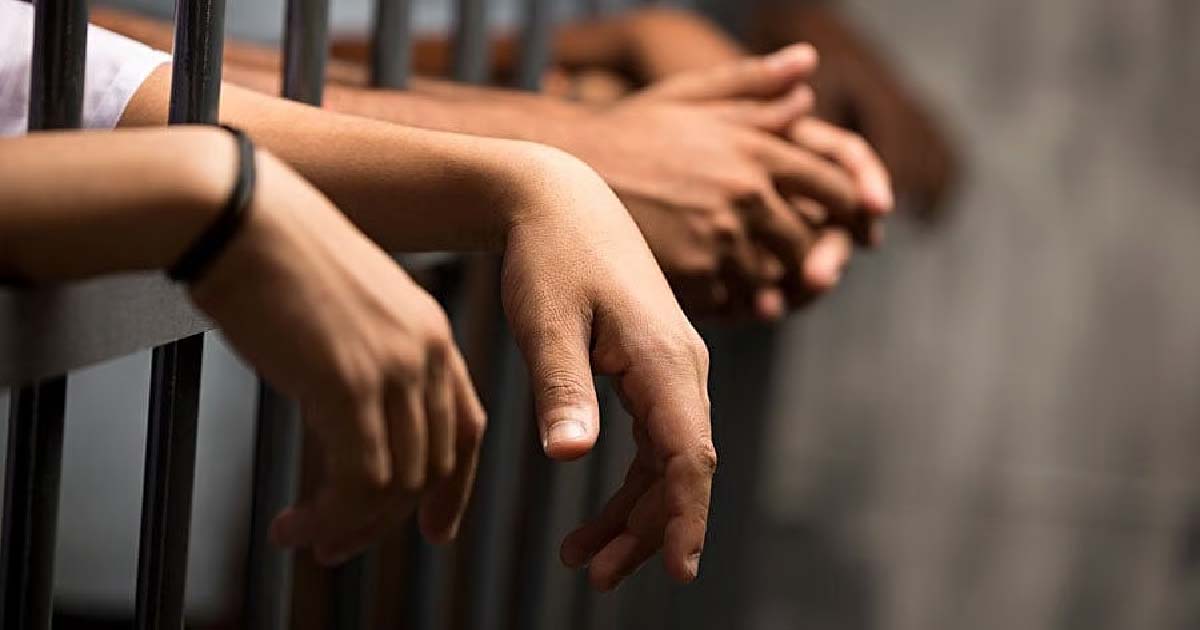
Palghar, Maharashtra, Dec 30: The Crime Detection Team of Naigaon Police Station has arrested two youths in connection with a case of forcible robbery that took place on the Mumbai–Ahmedabad National Highway in Vasai East earlier this month. A juvenile was also found to be involved in the crime.
According to police, the incident occurred on the night of December 21, 2025, near the Royal Garden Resort, close to the end of the Sasunavghar bridge on the Ahmedabad-bound carriageway at Vasai East in Palghar district.
The complainant was walking on the road when a white Maruti Suzuki S-Presso car stopped near him. Three unknown men, aged between 20 and 25 years, allegedly assaulted him with a steel bracelet and punches.
The accused threatened the victim, demanding cash and his mobile phone, and warned him of dire consequences if he resisted. They forcibly took his cash, mobile phone and charger.
The assailants also obtained the password to the victim’s Google Pay application under threat and later warned him not to inform anyone before fleeing the scene.
Following the complaint, Naigaon Police registered a case under relevant sections of the Bharatiya Nyaya Sanhita.
The senior police inspector of Naigaon Police Station formed two special teams from the Crime Detection Unit. After a detailed investigation, police apprehended Wasiulla Salim Khan (21) and Ranjit Sandeep Jaiswal (19), both residents of Naigaon, Vasai East.
During interrogation, the accused confessed to committing the robbery along with a juvenile in conflict with law. Police recovered two mobile phones and cash worth ₹31,700 from the accused. The car, valued at approximately ₹5 lakh, which was used during the commission of the crime, has also been seized.
Maharashtra
BMC Elections 2026: Congress Says ‘Together, We Shall Win!’ As It Releases 2nd List of 56 Candidates, Check Full List Here
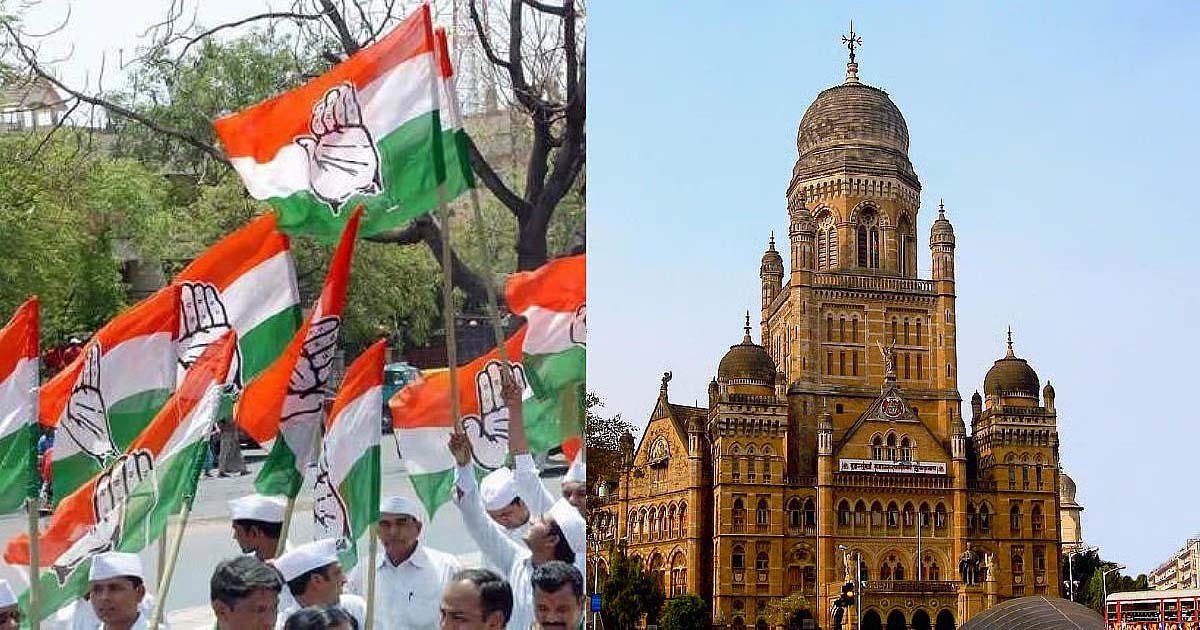
Mumbai: The Congress party on Tuesday, December 30, announced the second list of 56 candidates for the upcoming Brihanmumbai Municipal Corporation (BMC) Polls 2026 in Mumbai. The list includes candidates from key areas of the city, including Dahisar, Magathane, Charkop, Jogeshwari, Goregaon, Versova, Andheri, Bandra, Kalina, Bhandup, Ghatkopar, Chandivali, Kurla, Wadala, Mahim, and Mumbadevi. Voting for all 227 civic seats in Mumbai will be held on January 15, 2026, while the counting of votes and declaration of results will take place on January 16, 2026.
Yesterday, the party announced their first list of 87 candidates. With the second list announced, the total number of candidates announced is 143. Of the 57 candidates announced, the party has fielded 29 women candidates from the Open, SC, and OBC categories.
Ward No 3 (Magathane) Pradeep Ramakant Choubey
Ward No 8 (Dahisar) Ratnaprabha D. Junnarkar
Ward No 9 (Dahisar) Sadanand B. Chavan
Ward No 31 (Charkop) Bina Ramkubar Singh
Wards 37 (Dindoshi) Meena Dubey
Ward No 39 (Dindoshi) Madhu Brijesh Singh
Ward No 41 (Dindoshi) Rahul Ugale
Ward No 52 (Jogeshwari East) Swati Eknath,
Ward No 74 (Jogeshwari East) Samita Nitin Sawant,
Ward No 78 (Jogeshwari East) Siddiqui Shabana Bano
Ward No 79 (Jogeshwari East) Priyanka Manish Mishra
Ward 58 (Goregoan) Suryakant Mishra
Ward 60 (Versova) Gladys Shrier
Ward No 65 (Versova) Sufian Haider
Ward 72 (Andheri East) Gayatri Gupta
Ward 75 (Andheri East) Imran Khalil Shaikh
Ward No 86 (Andheri East) Nitin Salgare
Ward 87 (Bandra East) Pramod Narvekar
Ward 92 (Bandra East) Mohammad Ibrahim Mohammad Iqbal Qureshi
Ward 93 (Bandra East) Sharad Dinkar Shejawal
Ward 94 (Bandra East) Supriya Santosh Pathak
Ward 97 (Bandra West) Gauri Chhabria
Ward 99 (Bandra West) Sunita Suresh Vevekar
Ward 100 (Bandra West) Karen Demelo
Ward 101 (Bandra West) Reshma Zakaria
Ward 103 (Mulund) Manisha Santosh Sonawane
Ward 109 (Bhandup) Ajay Patel
Wards 112 (Bhandup) Shreya Rakesh Shetty
Ward 120 (Vikhroli) Khushboo Rajesh Gupta
Ward 126 (Ghatkopar West) Nasir Khan
Ward 133 (Ghatkopar East) Vaishali Phalke
Ward 143 (Anushaktinagar) Sheikh Farzana Reddy Vasha
Ward 145 (Anushaktinagar) Sufian Abdul Mubeen
Ward 149 (Kurla) Ganesh Awasthi
Ward 151 (Kurla) Sangeeta Subhash Bhalerao
Ward 159 (Chandivali) Prahlad Vishwanath Shetty
Ward 161 (Chandivali) Mohammed Imran Abul Hasan Khan
Ward 162 (Chandivali) Khan Mohammed Aamir Arif
Ward 163 (Chandivali) Jain Sonu Shailesh
Ward 166 (Kalina) Ghanshyam Bhapkar
Ward 180 (Sion Koliwada) Smita Shankar Mhatre
Ward 181 (Sion Koliwada) Kamlesh Ramdular Yadav (Pappu Yadav)
Ward 188 (Dharavi) Mariammal Muturamalingam
Ward 187 (Dharavi) Ayesha Aslam Khan
Ward 190 (Mahim) Dayashankar Ramgopal Yadav
Ward 200 (Wadala) Suresh Kale
Ward 205 (Shivadi) Apurva Praveen Salistekar
Ward 211 (Byculla) Khan Mohammad Waqar Nisar Ahmed
Ward 216 (Mumbadevi) Rajshree Mahesh Bhatankar
Ward 223 (Mumbadevi) Gyanraj Yashwant Nikam
Earlier on Sunday, the party announced its alliance with Prakash Ambedkar-led Vanchit Bahujan Aghadi (VBA) for BMC elections. Under the arrangement, Congress will contest 150 seats, while VBA will field candidates in 62 wards, leaving 9-12 seats for Rashtriya Samaj Paksha led by Mahadeo Jankar.
-

 Crime3 years ago
Crime3 years agoClass 10 student jumps to death in Jaipur
-

 Maharashtra1 year ago
Maharashtra1 year agoMumbai Local Train Update: Central Railway’s New Timetable Comes Into Effect; Check Full List Of Revised Timings & Stations
-

 Maharashtra1 year ago
Maharashtra1 year agoMumbai To Go Toll-Free Tonight! Maharashtra Govt Announces Complete Toll Waiver For Light Motor Vehicles At All 5 Entry Points Of City
-

 Maharashtra1 year ago
Maharashtra1 year agoFalse photo of Imtiaz Jaleel’s rally, exposing the fooling conspiracy
-

 National News1 year ago
National News1 year agoMinistry of Railways rolls out Special Drive 4.0 with focus on digitisation, cleanliness, inclusiveness and grievance redressal
-

 Maharashtra1 year ago
Maharashtra1 year agoMaharashtra Elections 2024: Mumbai Metro & BEST Services Extended Till Midnight On Voting Day
-

 National News1 year ago
National News1 year agoJ&K: 4 Jawans Killed, 28 Injured After Bus Carrying BSF Personnel For Poll Duty Falls Into Gorge In Budgam; Terrifying Visuals Surface
-

 Crime1 year ago
Crime1 year agoBaba Siddique Murder: Mumbai Police Unable To Get Lawrence Bishnoi Custody Due To Home Ministry Order, Says Report









